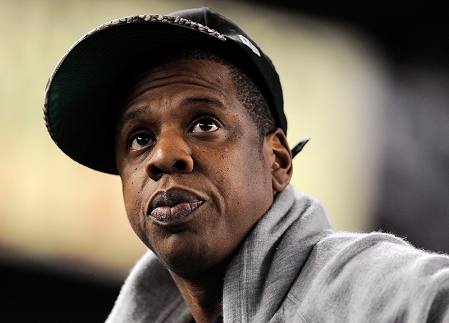Erstellt am: 1. 4. 2015 - 15:40 Uhr
Tidal
On Monday, Jay-Z and a group of some of the most successful artists in the music industry got on stage to present their vision for the future of music.
An artist owned, premium streaming service that offers uncompressed music streams for twice the price of the competition. Though you might not have guessed that from the way they opened up the relaunch event.
So what is it really?
Just another streaming service? A tailored experience for audiophiles and music lovers? The wave of the future?
Nope. Apparently it's a revolution.
Artists involved were using the hashtag #tidalforall to ask their supporters to change their user icons to a light blue and support, well, something:
Together, we can turn the tide and make music history. Start by turning your profile picture blue. #TIDALforALL
— KANYE WEST (@kanyewest) March 30, 2015Kanye and crew were pretty convinced that they had come together to address an issue that has been dogging the music industry for ages. A sad lack of cash actually making into the pockets of the people who create the music.
Remember Taylor Swift?
Taylor got quite a bit of press last year after writing an opinion article for the Wall Street Journal (which is now behind a pay wall) explaining her view of the state of the music industry and her problems with the payouts on offer. She really didn't feel she was getting enough, and didn't want to undervalue her product. So she pulled her tracks from Spotify.
That article sums up what has been causing some conflict for quite some time. Despite the fact that Spotify spends around 70% of its money on royalties and paying rights holders, the amount ending up in the bank accounts of most artists just wasn't very much.
And now we have Tidal. A company owned by the artists. Well, mostly Jay-Z, but according to an interview he gave Billboard magazine, the other musicians on stage with him at the relaunch all received 3% shares in the business as well.
Tidal isn't just artist owned, it is also promising to pay more royalties than the competition. Which should mean that more money ends up in the artists hands.

APA/EPA/JUSTIN LANE
Jay-Z used the term fair trade a few times in the Billboard interview: "If you put in work, everyone else, you go to work you get paid. That’s fair trade. It’s what our country is built on."
So that's the key. That's the marketing angle being used to sell this new streaming service. Fair trade for musicians. A social movement. A revolution. Taylor Swift is streaming her music there.
Fair Trade?
How music royalties work
My inner idealist really would like this to be true. I just don't know how it could be.
Music royalties are a complex thing, and that 70% that Spotify was claiming to pay out is actually divided between a lot of different interests. That isn't their choice, it's the way the business works.
Going in to too much detail would require another multi-page article, but one important fact that needs to be stated is this: The labels and rights holders are the ones getting paid by Spotify. The labels then pay a percentage of the royalties they received to the artist. A sum that can range between 10-50%, minus some things that the labels contracts say they can charge the artist for.
But don't take my word for it. Billy Bragg, another idealist who has a much better idea about how the music industry works, has said it himself: "Labels not Spotify deserve streaming music payouts scrutiny"
Of course, in the case of Spotify and some other streaming services, the labels actually get to double dip. They get paid out through royalties AND they are part owners of the platform.
So how is Tidal going to change that?
I don't know. It's the question that isn't being asked. The thing we can't find out. Even studies that have shown the labels to be taking the lions share of streaming cash end up getting relativised by claims that 95% of that is costs.
Simply stating that royalties from impressions made by premium account listeners can't really have much of an effect on things like artists contracts.
Like I said, I hope I'm wrong, but there is one sentence I ran into from another article that really works against that. "Each of the 16 participating artists are believed to have been gifted 3% equity in the company, with the remaining stakes owned by Jay Z, another investor and the record labels."
Sounds a lot like the other streaming services.
Unless Tidal starts making it clear that other artists will also be offered a chance at some form of equity or finds a way to pressure the industry into changing some major business practices, it seems like this musical revolution is just a case of the same old things.


